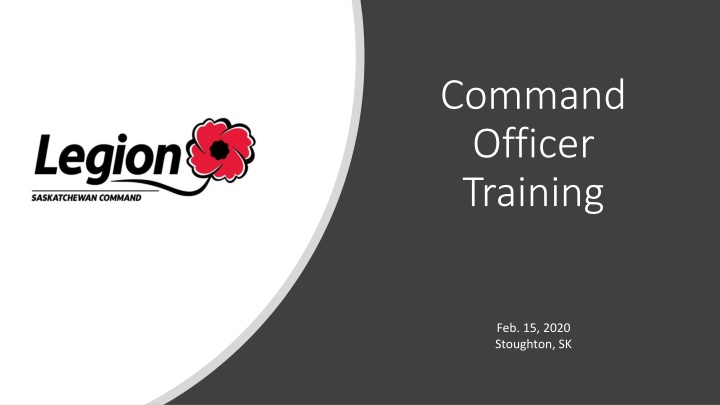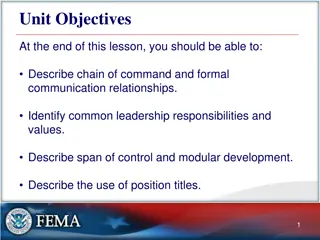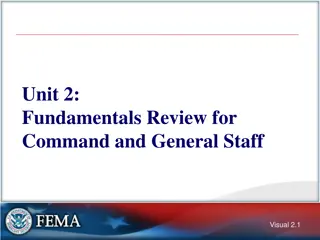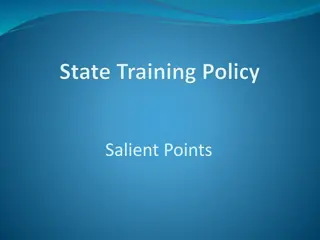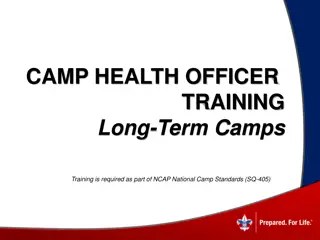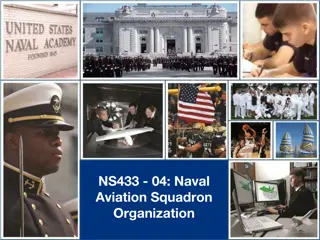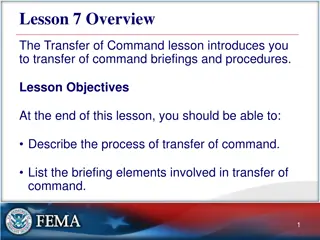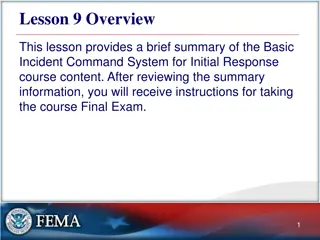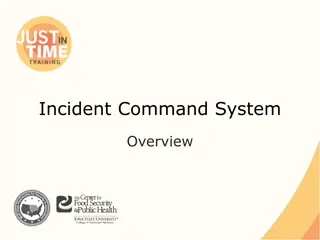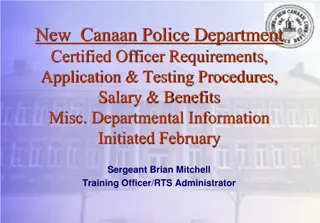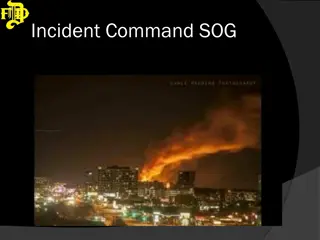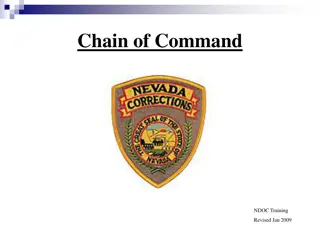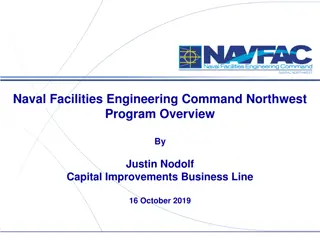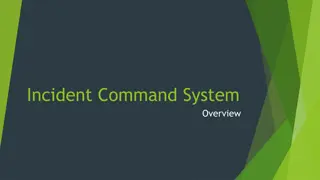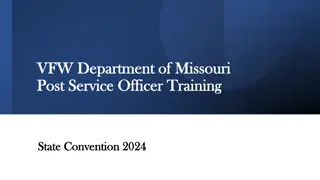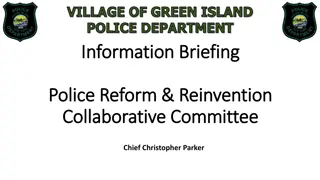Command Officer Training Overview - Feb. 15, 2020
Explore the essential elements of the Command Officer Training held on Feb. 15, 2020, in Stoughton, SK. The training covers topics such as Legion's mission statement, chain of command, leadership, dress code, conflict management, communication, and more. Learn about the responsibilities of district and zone commanders, successful leadership traits, and the significance of serving veterans and communities. Discover the key aspects of being a leader and effective communication strategies to inspire and build strong teams.
Download Presentation

Please find below an Image/Link to download the presentation.
The content on the website is provided AS IS for your information and personal use only. It may not be sold, licensed, or shared on other websites without obtaining consent from the author.If you encounter any issues during the download, it is possible that the publisher has removed the file from their server.
You are allowed to download the files provided on this website for personal or commercial use, subject to the condition that they are used lawfully. All files are the property of their respective owners.
The content on the website is provided AS IS for your information and personal use only. It may not be sold, licensed, or shared on other websites without obtaining consent from the author.
E N D
Presentation Transcript
Command Officer Training Feb. 15, 2020 Stoughton, SK
Welcome and Overview
Welcome Commanders Welcome Commanders Welcome and Introductions Ice Breaker Seminar Overview
Seminar Overview Seminar Overview Legion s Mission Statement Chain of Command Leadership Dress and Deportment District Commander Responsibilities Zone Commander Responsibilities
Seminar Overview Seminar Overview Conflict Management Communication Sports Membership Poppy
Legions Mission Statement
Legion Mission Statement To serve Veterans, which includes currently serving military and RCMP members and their families. To promote remembrance and to serve our communities and our country.
Chain of Command
Chain of Command Dominion Executive Council Provincial Executive Council District Zone Command Office Branch
Being a Leader Successful Leader Dress and Deportment
Successful Leaders Communicate Inspire Build Teams Resolve Conflict Be Open To Change Be Committed Share The Same Vision
Dress and Deportment Module 2
District Commander Responsibilities
District Commander Responsibilities Responsibilities to Command, District, Deputy, and Branch
Zone Commander Responsibilities
Zone Commander Responsibilities Responsibilities to Command, District, Deputy, and Branch Branch Operations Branch Level Job Description Branch Visits
Responsibilities to Command - Represent Command, relaying information from correspondence, policy changes, and branches issues appropriately. - Collection of branch reports (Branch Financials, Poppy Trusts, Membership Rates, Branch Officer Listing)
Responsibilities to your District Commander Relay on problems/situations with the branches Give a copy of each branch visit report Communicate sporting event dates and locations Communicate list of winners of zone sporting events in timely manner Provide the zone winner s list and stats report for Poster Literary contest Help plan events and rallies
Responsibilities to your Deputy - Share all duties equally - Prepare them to take over - Empower them to learn - Organize all Events - Ensure they do not overlap - Communicate - Keep abreast of what is happening in the zone
Responsibilities to your Branches - Introductions - Ensure they know who you are - Zone Commanders fund - Establish and report - Communicate - Be available and easy to communicate with - Brainstorming - Offer Assistance - Need Help? - Ask District Commander, Council, Command Office
Branch Operations Branch Organization - Branch Autonomy - Branch Executive - Committees Other Resources: Module 3 Branch Management Module 5 How to conduct a meeting
Branch Level Job Description - Common Branch Positions and Chairs. President Secretary Chairperson Immediate Past President Vice President Treasurer Service Officer Poppy Chairperson Membership Chairperson Public Relations Chairperson Entertainment Sgt-At-Arms Chaplain Sick & Visiting Sports - Saskatchewan Command Brochures Other Resources: Module 1 Job Description
Branch Visits - Must be done each year - Expenses are paid for 1 visit per branch per year - Branch Visit Form is to be completed and sent to your District Commander along with your expense form - Note any problem areas and report on potential solutions. Seek advice when needed.
Conflict Management
Conflict Management - Conflict is inevitable - Team effort to resolve - Resolution styles - Guiding principals Other Resources: Module 6 Listening and Interpersonal Skills Module 4 Public Relations and Outreach
Conflict Management Differences in needs, objectives and values Differences in perceiving words, actions and situations Unwillingness to work through issues, collaborate or compromise Conflict Differing expectations of outcomes favorable versus unfavorable
Conflict Resolution Styles Style Characteristic User Justification Differences too minor or too great to resolve. Attempts might damage relationships or create even greater problems. Non-confrontational. Ignores or passes over the issue. Denies issues are a problem. Avoidance Agreeable non-assertive behaviour. Cooperative even at the expense of personal goals. Not worth risking damage to relationships or general disharmony. Accommodating Survival of the fittest. Must prove superiority. Most ethically or professionally correct. Confrontational, assertive and aggressive. Must win at any cost. Win/Lose Important all parties achieve basic goals and maintain good relationships. Aggressive but cooperative. No one person or idea is perfect. There is more than one good way to do anything. You must give to get. Compromising When parties will openly discuss issues, a mutually beneficial solution can be found without anyone making a major concession. Needs of both parties are legitimate and important. High respect for mutual support. Assertive and cooperative. Problem Solving
Guiding Principles 1)Preserve Dignity and Self Respect 2)Listen with Empathy 3)Don t Expect to Change Others Behavioral Style 4)Express Your Independent Perspective
Communication - Online Portal - Emails - Correspondence Other Resources: Module 6 Listening and Interpersonal Skills Module 4 Public Relations and Outreach
Sports - Comradery - Provincial Committee and changes - Provincial Events - General Guide for running an event
Membership - Importance of Membership - Membership Concerns and Solutions - Membership Awards - Branch Renewal Strategy - Branch Hospitality Program Other Resources Module 8 Honours and Awards Protocol Module 9 Legion Orientation
S.E.R.V.I.C.E. S-mile E-nquire R-emember V-ery nice to see you I-ntroduce C-onnect E-ntice to Join
Poppy - Campaign - Poster Literary - Programs - Use of Funds
ROUND TABLE ANY QUESTIONS OR FEEDBACK?
